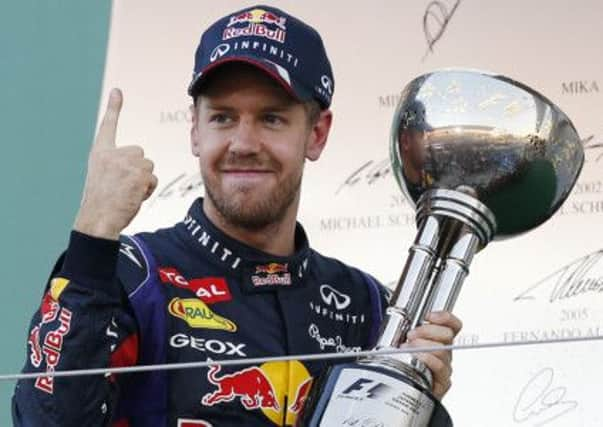Formula One: Sebastian Vettell’s winning streak


Since when has watching winners been boring? Seriously, were Muhammad Ali, Usain Bolt, Donald Bradman, Chris Hoy, Mo Farah or Tiger Woods in their pomp boring?
Hamilton may be bored of being beaten by Vettel, but he’s surely becoming used to it. The German was at it yesterday in India, where he was fastest in qualifying, and the degree of his superiority over his rivals is now remarkable.
Advertisement
Hide AdAdvertisement
Hide AdHe has just become only the sixth driver in F1 history to win five grands prix in succession, and has won nine out of this season’s 15 races, only failing to finish once. He has already beaten his points totals from 2010 and 2012, and is closing in on his winning margin of 122 points in 2011, which was almost double Schumacher’s previous record winning margin of 67 points in 2002, albeit when scoring was different.
With every race, Vettel is closer to becoming the most successful driver Formula One has seen. If the German, who has a 90-point lead over Fernando Alonso with four grands prix still to race, claims the fifth-placed finish he needs to win a fourth consecutive championship today, he will become only the third driver to win four in a row, following in the slipstream of Juan Manuel Fangio (1951 and 1954-7) and Schumacher (1994-5 and 2000-4). Where once Schumacher’s record of back-to-back championships with Benetton followed by five-in-a-row with Ferrari looked unassailable, few would bet against the Red Bull driver eclipsing it.
It is impossible to overstate the magnitude of Vettel’s achievement. Like Schumacher, he has enjoyed the dominant car, whereas Fangio won five world championships in five different cars.
But his 297 points this year are double those of experienced team-mate Mark Webber, who has 148. That, along with the fact that, in Singapore, he lapped two seconds a lap faster than all his rivals, torpedoes any idea that he is a lucky beneficiary of Red Bull’s billions and designer Adrian Newey’s genius. And, unlike Schumacher, who had no real rivals when he won his first championships, Vettel’s success has been achieved while competing against five former world champions, with four of them – Alonso, Jenson Button, Lewis Hamilton and Kimi Raikkonen – in their prime and driving competitive cars.
When Vettel claims his fourth title, he will, at 26, be the youngest to do so. Fangio was 46 when he achieved the feat, while Schumacher was 34, and Alain Prost (the only other driver to win four titles, albeit not consecutively) was 38. But then Vettel is used to registering firsts. He became the youngest driver in Formula One history when he competed in the 2006 Turkish Grand Prix aged 19 years and 53 days, and is the youngest driver to set the fastest lap, the youngest to score an F1 point, the youngest to start on pole, to lead a race, to win from pole, to stand on the podium, to win a grand prix, to win the world championship, and to become a multiple F1 champion.
Apart from his unflappable and refreshingly down-to-earth personality, one of Vettel’s defining characteristics is his encyclopaedic knowledge of F1 history and his desire to etch himself into its history.
He shows far less interest in the fripperies and financial rewards of the sport – reports say that he is on course to be richer than Tiger Woods – than with his legacy. Despite his achievements, there are still several bits of unfinished business. With 35 career victories, for instance, he is only fourth on the list of career victories, behind Schumacher (91), Prost (51) and Senna (41), and just three ahead of Alonso, while his 58 podiums pale next to Schumacher’s 155, Prost’s 106, Alonso’s 94, Senna’s 80 and Nelson Piquet’s 60. Even Raikkonen has 77 podiums.
As for today’s race at the Buddh circuit, Vettel has spoken of his desire to close out the last nine races of the year, a feat only ever achieved by legendary Italian Alberto Ascari with Ferrari in 1953. No matter how much he achieves, it seems there are always more records to break.
Advertisement
Hide AdAdvertisement
Hide AdWith a decreasing number of exceptions (Jacques Villeneuve remains a trenchant critic and some fans still boo Vettel for ignoring team orders in Malaysia and overtaking Webber for the win) the insiders have already made up their mind. His engineer Giorgio Ascanelli, who worked with Senna and Schumacher, saw greatness in Vettel when he changed the gearing on the Red Bull, which had good straight-line speed but struggled pulling out of corners, so that overtaking the German became much trickier. “Twice in my life have I experienced perfection,” said Ascanelli. “Once with Senna, again with Vettel – Schumacher was different because he had to work harder for his success.”
Unlike his boyhood hero Schumacher, Vettel is also a very down-to-earth, earnest soul with a British Carry On-style humour, who has managed to be successful without alienating his fiercest rivals.
“Seb is a great champion!” tweeted Lewis Hamilton. “Not only that, he is a great human being who is funny and humble [and] deserves all the success he is having! I admire his dedication & ability to consistently perform without mistakes. This is the mark of a true champion. Regardless of what you & I may think about his car, at the end of the day he’s doing the perfect job. I’m just grateful I get to drive in an era with so many great drivers like him.”
If you know a man by what his opponents think of him, the German doesn’t need to win the drivers championship this afternoon to have attained greatness. Not that such thoughts will cloud his mind. He only knows one way and it’s flat out.